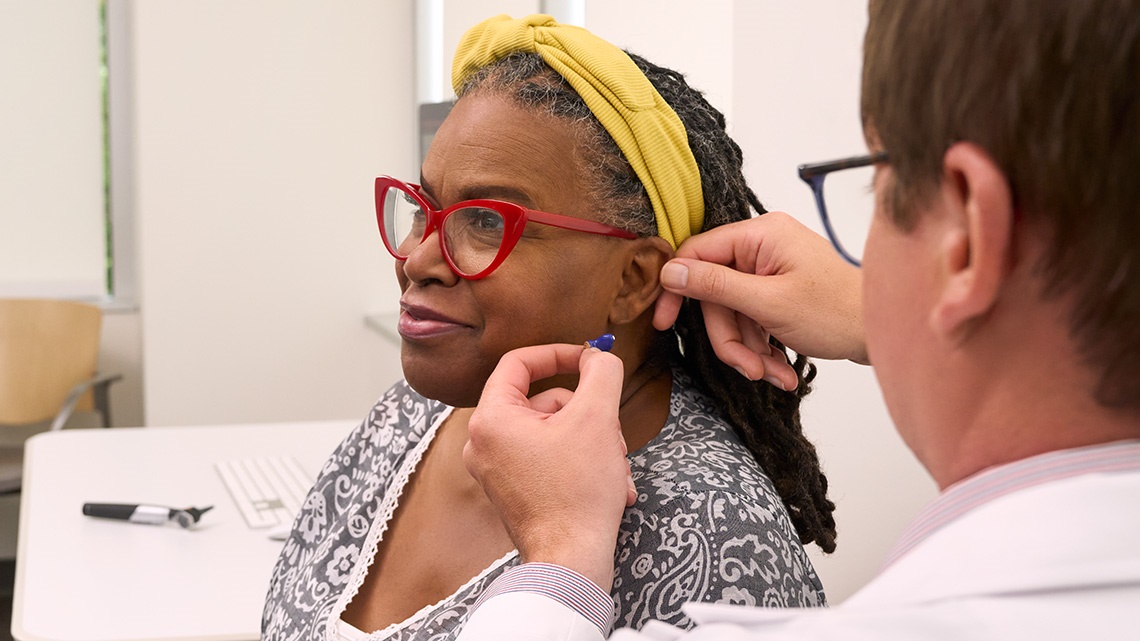Menu
Hearing Care Options
Hearing loss is sometimes referred to as “the invisible handicap” because there are no outward signs of a handicap or limitations. The loss is almost always gradual, usually occurring over a period of years, and there is rarely any pain. Damage to the ear and hearing can occur as a result of disease, aging, injury and noise or certain medicines.
Hearing is a vital link to our world; it connects us to friends, families and the world around us. Loss of hearing can be life altering and devastating – often leading to depression, withdrawal, anxiety, confusion and short-term memory loss. The good news? Hearing aids can reverse or prevent these consequences.
Good Hearing Helps Keep You Safe
Being able to hear warnings at home, in public and at work is critical to our safety. Studies have linked hearing loss to reduced alertness and increased risk to personal safety. From a biological standpoint, one of the roles of hearing is to warn us of danger. If a person has untreated hearing loss, they are at a higher risk of having an accident because they cannot hear every day sounds that usually prevent us from getting hurt.
We rely on many different sounds in the home to alert us:
● A pot boiling over on the stove
● A knock on the door
● A smoke detector or alarm system
● A ringing phone or doorbell
Safety in the home is a serious concern. Relative to the general population, adults age 65 and older are at double the risk of dying in a house fire; this statistic increases to four times as likely for seniors age 85 and older (FEMA, 2009). If you are unable to hear any of the examples listed above, it is time to have your hearing tested by a professional Hearing Care Provider.
“Loss of hearing is a serious life issue, a medical condition that is associated with physical, emotional, mental and social wellbeing. Depression, anxiety, emotional instability, phobias, withdrawal, isolation, lessened health status and lessened self-esteem have all been linked to uncorrected hearing loss,” National Council on Aging.
Two Ears are better than one
Ears come in a pair for a reason. Not only do two ears allow us to hear sound from a wider range of direction, but the quality is better – like the difference between mono and stereo settings on a speaker.
Hearing well with both ears significantly increases our ability to hear and understand speech. However, more than 80% of the time, if hearing loss is present then both ears will be affected (Siemens, 2017). Having your hearing tested is how you can be sure you are hearing well with both ears.
Five Benefits of Hearing Well With Both Ears
1. Listen to the specific sound you want to hear (even in background noise). Hearing more sounds actually helps your ears filter out the ones that are not important. This means your ears can focus on one voice while shifting competing noise to the background.
2. It’s easier to pinpoint where a sound is coming from. Being able to identify the direction of a sound is called “localization” (Kochkin, n.d.). Two ears are better at helping recognize a sound’s source – whether it’s a knock on the door, a pot boiling on the stove or a vehicle pulling into the driveway.
3. Sounds are clearer. The sounds that the letters “th”, “s” and “f” make are similar, as are consonants such as “ch”, “k” and “t” which are even harder to tell apart with hearing loss. Not hearing certain sounds makes it very difficult to understand what someone is saying, even when you can hear them. Hearing well with both ears fills these sound gaps so you don’t miss any words.
4. You can hear farther. With one ear, an average person hears about 10 feet. With two ears, that distance increases to almost 40 feet! (Kochkin, n.d.)
5. Hearing is less tiring. Hearing with one “good ear” strains the listener and, over time can be extremely tiring. Two ears provide a balanced input of sound, requiring less effort to hear.
Hearing Aids
Hearing aids are small electronic devices that you wear in or behind your ears. They make some sounds louder so that you can listen, communicate and participate more fully in daily activities. If you have hearing loss, hearing aids can help you hear more clearly in both quiet and noisy situations.
Hearing aids receive sound through a microphone, which converts the sound waves to electrical signals and sends them to an amplifier. The amplifier increases the power of the signals and then sends them to the ear through a speaker. Advanced technology has additional functionality to address complex hearing situations, such as background noise or feedback. Miniature computerization provides more features and better signal processing.
You May Benefit From Hearing Aids If…
● Your hearing frustrates you when interacting with family or friends.
● Your loved one tells you that he or she often must repeat what was said.
● Your hearing issues causes embarrassment.
● You have difficulty hearing the TV or radio at a normal volume level.
● Your hearing causes arguments with family members.
● You feel that hearing difficulties hinder your social life.
● You attend religious services or group activities less often because of your hearing.
● Your hearing creates problems for you when visiting a restaurant.
● It is difficult for you to understand when someone whispers.
Hearing aids can significantly improve the hearing and speech understanding of people with hearing loss. Damage to the ear and hearing can occur as a result of disease, aging, injury, noise or certain medicines. Hearing aids magnify sound vibrations entering the ear. Surviving nerve cells detect larger vibrations and convert them into neural signals that are passed along to the brain. The greater the damage to the nerve cells, the more severe the hearing loss, and the greater the hearing aid amplification needed
There are, however, practical limits to the amount of amplification a hearing aid can provide. In addition, if the inner ear is too damaged, even large vibrations cannot be converted into neural signals. Sometimes assistive listening products along with hearing aids can provide a solution.
If you have hearing loss, hearing aids may be able to help you hear more clearly in both quiet and noisy situations.
Quality of sound is better quality of life
The majority of hearing aid users who have worn both binaural and monaural hearing instruments report a significant improvement in sound quality with two hearing aids.
AARP and its affiliates are not insurers, agents, brokers or producers. Providers pay a royalty fee to AARP for the use of its intellectual property. These fees are used for the general purposes of AARP.

Featured AARP Member Benefits
-
Insurance
AARP® Medicare Supplement from UnitedHealthcare®
Medicare Supplement plans
Learn MoreSee more Insurance offers > -
Insurance
AARP® Medicare Advantage from UnitedHealthcare®
Medicare Advantage plans
Learn MoreSee more Insurance offers > -
Health & Wellness
AARP Long-Term Care Options from New York Life
Custom long-term care options to fit your needs and budget
Learn MoreSee more Health & Wellness offers >

